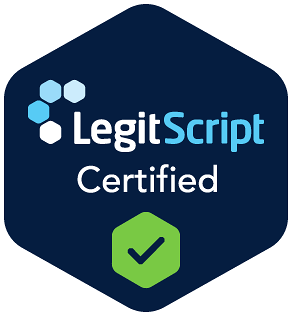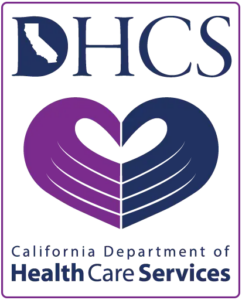Living with obsessive-compulsive disorder (OCD) is challenging on its own. When paired with addiction, the cycle can feel overwhelming and isolating. People experiencing both conditions may find themselves trapped between intrusive thoughts, compulsive behaviors, and the numbing or distracting effects of substances. At Surf City Detox, a trusted detox center in Huntington Beach, CA, we recognize the unique challenges of co-occurring OCD and addiction, and we are committed to providing specialized, evidence-based care tailored to each individual.

For example, someone with contamination-related OCD may obsess about germs and respond by washing their hands repeatedly, sometimes to the point of physical harm. While the compulsion may briefly ease anxiety, the relief is temporary, and the obsession soon returns, perpetuating the cycle.
OCD affects approximately 2.3% of adults in the U.S. and can manifest in a variety of ways. It is not a personality quirk or a desire for orderliness. Rather, it’s a debilitating mental health condition that requires appropriate treatment and support.
Types of OCD
- Contamination OCD: Involves intense fear of germs, dirt, or illness, leading to cleaning and avoidance behaviors.
- Checking OCD: Characterized by constant checking (e.g., locks, appliances, or body symptoms) driven by fears of harm or mistakes.
- Symmetry and Ordering OCD: A preoccupation with symmetry, balance, and order, often accompanied by compulsive arranging or counting.
- Intrusive Thoughts OCD: Unwanted thoughts of a violent, sexual, or blasphemous nature that cause distress. These are not reflective of a person’s desires or character.
- Hoarding: Once classified under OCD, hoarding involves difficulty discarding items, leading to clutter that disrupts daily life.
While these categories help with diagnosis, many individuals experience symptoms that cross multiple subtypes.
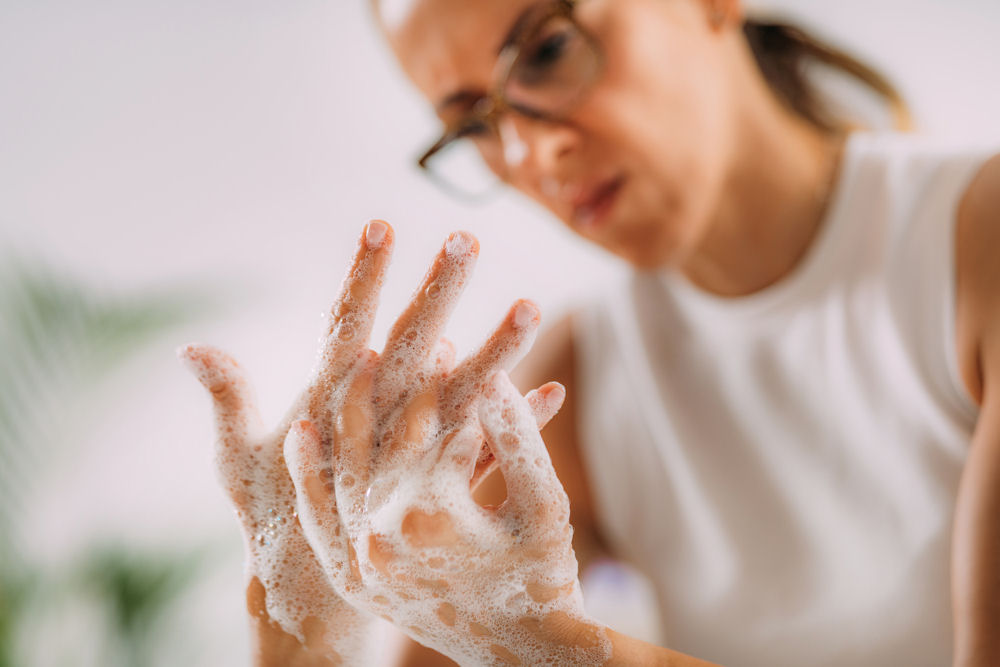
Signs and Symptoms of OCD & Addiction
OCD Symptoms
- Persistent, intrusive thoughts that are distressing or irrational
- Ritualistic behaviors (e.g., hand-washing, checking, counting) are intended to reduce anxiety
- Avoidance of people, places, or things that may trigger obsessions
- Excessive need for reassurance
- Difficulty concentrating due to obsessive thoughts
Time-consuming rituals that interfere with daily functioning
Addiction Symptoms
- Increased tolerance to substances, requiring more to achieve the same effect
- Withdrawal symptoms when not using
- Inability to stop using despite negative consequences
- Neglecting responsibilities, relationships, or personal well-being due to substance use
- Using substances to cope with stress, anxiety, or mental health symptoms
- Engaging in risky behaviors to obtain or use substances
Individuals with OCD may initially use alcohol or drugs to escape their thoughts or reduce the anxiety caused by their compulsions. Over time, this coping mechanism can evolve into a substance use disorder, creating a dangerous and reinforcing cycle.

The Connection Between OCD & Addiction
There are several reasons why OCD and addiction often co-occur:
- Coping Mechanism: Substances may offer temporary relief from anxiety, making them a seemingly effective escape from obsessive thoughts.
- Neurobiological Links: Both conditions are linked to dysregulation in similar brain regions, such as the orbitofrontal cortex and the basal ganglia.
- Isolation and Shame: The shame and secrecy that often accompany OCD can drive individuals to hide their struggles and numb emotional pain with substances.
- Delayed Diagnosis: People may be misdiagnosed with anxiety or depression alone, leaving OCD untreated and increasing vulnerability to addiction.
It is also worth noting that OCD can take on a behavioral addiction quality when compulsions become so habitual that they mimic substance dependency patterns. In such cases, a person might perform a ritual not only to reduce anxiety but also to experience a sense of relief or pleasure, similar to what happens with drug use. These blurred lines emphasize the importance of accurate diagnosis and integrative treatment.

Does OCD Cause Addiction?
In this way, OCD may be seen as a risk factor or a contributing condition rather than a direct cause. It’s also important to note that substance use can worsen OCD symptoms. For instance, stimulant drugs can increase anxiety and trigger obsessive thinking, while alcohol may impair cognitive control, making compulsive behaviors harder to resist.
Addiction vs. Compulsion: Is Compulsive Behavior the Same as Addiction?
- Addiction involves a reward-seeking cycle driven by pleasure, euphoria, or emotional escape. It typically leads to physical dependence, cravings, and withdrawal symptoms.
- Compulsion, on the other hand, is behavior driven by the need to relieve anxiety or distress caused by intrusive thoughts. Compulsions are not pleasurable; they are performed out of a sense of necessity or fear.
That said, both addiction and compulsion share features like repetition, loss of control, and negative consequences. In cases of co-occurring OCD and addiction, compulsive behavior and substance use can reinforce each other. For example, someone might compulsively drink alcohol every night to complete a ritual that they believe will keep their family safe.
Understanding these differences is crucial in treatment, as each condition must be addressed in ways that reflect its underlying cause and function.
Treatment for OCD & Addiction

Men, in particular, may struggle with the stigma of seeking help for OCD or addiction. Cultural norms often portray emotional vulnerability or mental health concerns as a weakness. As a result, many men suppress their symptoms or turn to substances as a coping mechanism. At Surf City Detox, we create a compassionate and judgment-free environment that encourages clients of all genders to embrace their healing journey.
Our dual diagnosis program includes:
- Comprehensive Assessment: Each client undergoes a full evaluation to determine the severity of both OCD and substance use.
- Medical Detox: For those with physical dependence, detoxification is conducted under the supervision of licensed professionals to ensure safety and comfort.
- Medication Management: In some cases, medications such as SSRIs (selective serotonin reuptake inhibitors) can reduce OCD symptoms and support recovery.
Individualized Treatment Plans: Each plan addresses both conditions through evidence-based therapies and holistic care.
- Cognitive Behavioral Therapy (CBT): Especially effective for OCD, CBT helps clients recognize and reframe intrusive thoughts while developing healthier coping mechanisms.
- Exposure and Response Prevention (ERP): This gold-standard treatment for OCD involves gradual exposure to fears while preventing compulsive responses.
- Motivational Interviewing: Helps clients explore their ambivalence toward recovery and strengthens their motivation to change.
- Trauma-Informed Care: Many individuals with OCD and addiction have a history of trauma. Our clinicians are trained to provide care that promotes safety and empowerment.
- Group Therapy: Facilitated group sessions provide community, accountability, and the opportunity to learn from others on a similar path.
Family Therapy: OCD and addiction impact the entire family system. We work with loved ones to rebuild trust, improve communication, and support long-term healing.

Recovery is Possible at Surf City Detox
We don’t just treat symptoms, we treat people. Our clinicians, therapists, and support staff are here to listen, understand, and walk beside you as you reclaim your health and confidence. From the moment you contact us, you’ll feel seen, heard, and supported in a space that honors your experiences and celebrates your progress.
If you or a loved one is struggling, know that you are not alone. There is no shame in asking for help, and there is immense strength in choosing recovery. Contact Surf City Detox today to begin your path to a healthier, more peaceful future.
Surf City Detox Accepts Insurance
We accept many insurance plans to help cover the cost of addiction treatment. Contact your provider to get more information or call our office to reach an intake specialist.


